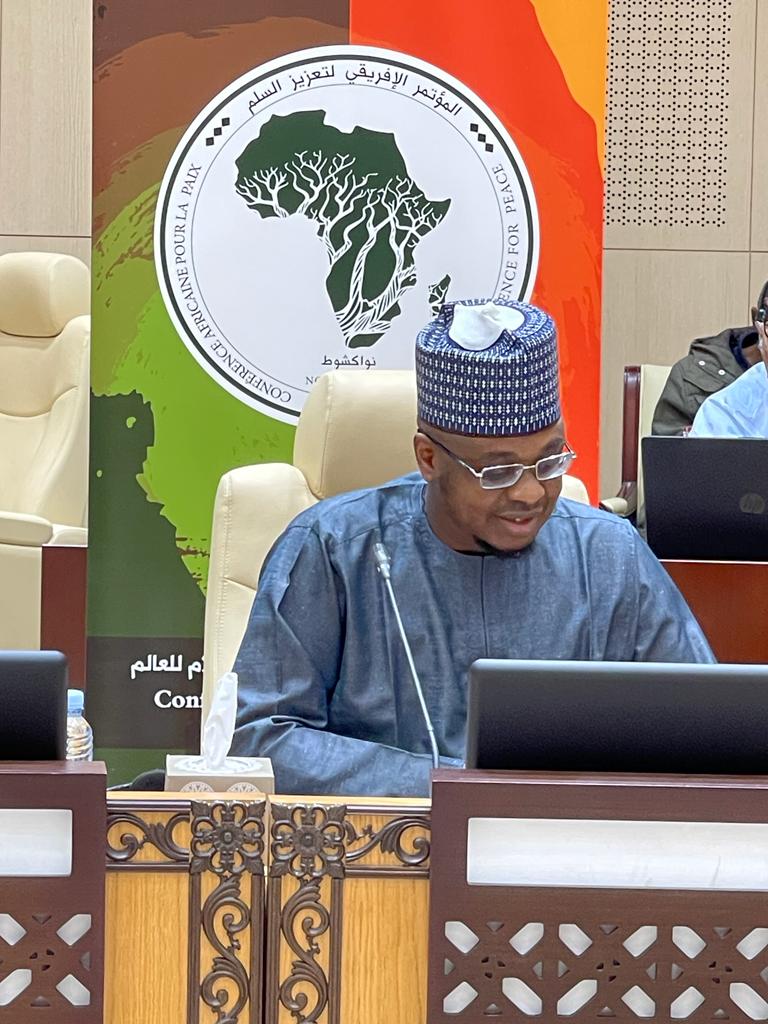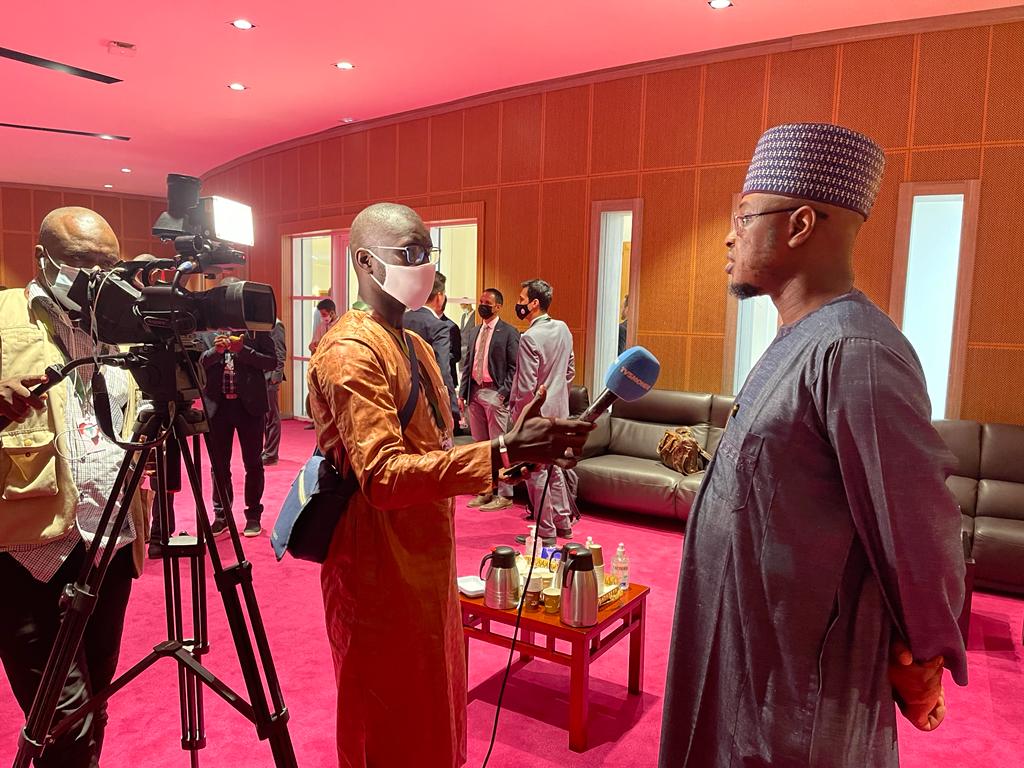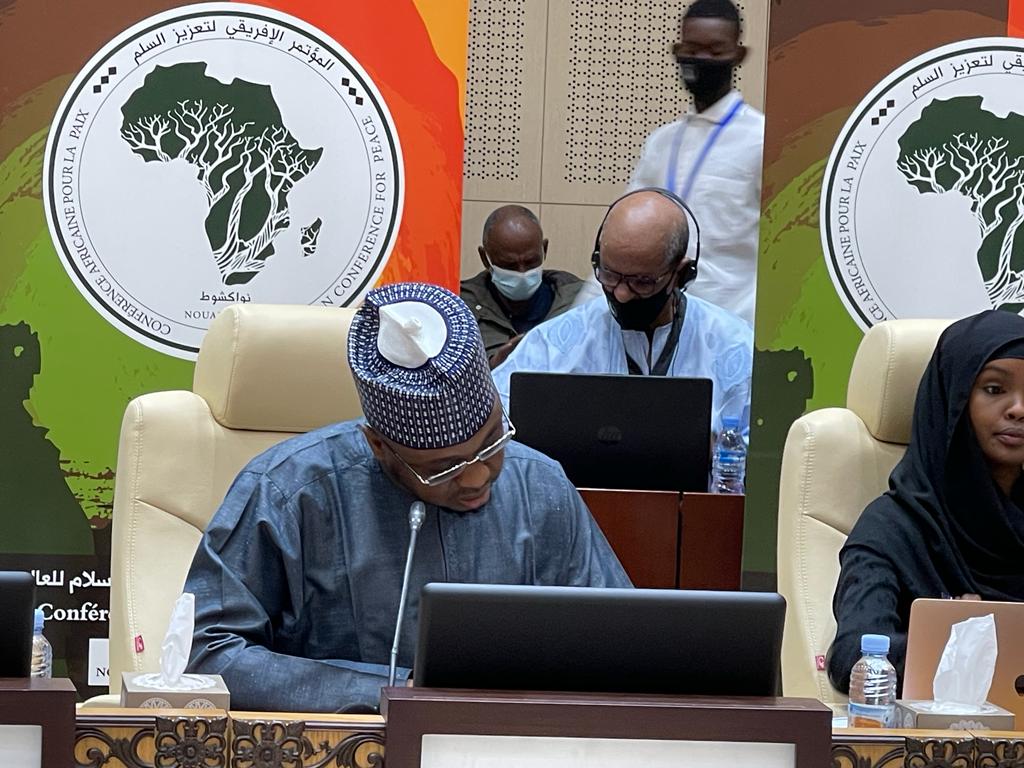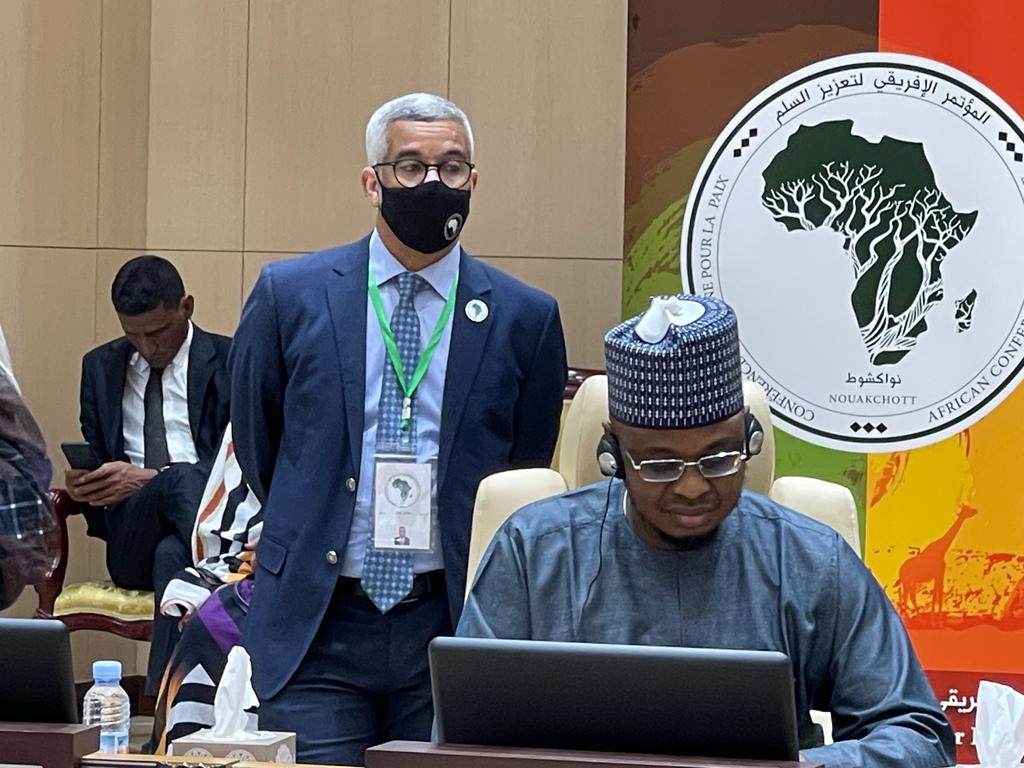
Youth and Fake News in Africa: The Way Out by Prof Pantami
- Post by: Ahmad
- February 9, 2022
- Comments off
Being a Speech Delivered at the Second Assembly for The African Conference for Peace in Nouakchott, Islamic Republic Of Mauritania
All Protocols duly observed.
May Peace, Mercy and Blessings be upon you!
I am very delighted to welcome you all to the Second Assembly of the African Conference for Peace being held in Nouakchott with the theme “Spreading Peace in the World” under the auspices of His Excellency, Mr Mohamed Ould Cheikh El Ghazouni, President of the Islamic Republic of Mauritania.
The percentage of youth population particularly in Africa is huge, according to Population Reference Bureau : “ By 2030, young Africans are expected to make up 42 percent of the world’s youth and account for 75 percent of the those under age 35 in Africa. With such a large population of young people, supportive policies and programs on inclusive youth development are critical now more than ever. Harnessing the demographic dividend and expanding opportunities for young people—to the benefit of all Africans—will require sound data and evidence on the status of African youth.”
Accordingly, if we conclude that Africa has the youngest population worldwide, we could be right statistically. Therefore, this is a clear indication that if we must get things right in Africa, then we must pay close attention to the youth. This further establishes the relevance of the topic I am being asked to speak on, because the future of Africa largely depends on what contribution comes from the largest portion of its population, and the African Conference for Peace which is currently being held here in Nouakchott is a key driver in achieving that. If we have to get it right, we have to discuss it first, and find the problems, and set strategic plans to get rid of the problems. To address the key issues raised under this topic, I will discuss each part separately.
How Can Youth Contribute To Promoting Inclusive Society?
There are many roles that youth could play in promoting inclusive society, however, to effectively discuss the role of youth or the contribution of youth in promoting inclusive societies, we have to first identify some key elements that are significant in ensuring an inclusive society such as:
⦁ effective leadership;
⦁ participation in civic, social, economic and political activities;
⦁ respect for all human rights, freedoms and the rule of law;
⦁ universal access to public infrastructure;
⦁ equal access to public information;
⦁ equity in the distribution of wealth and resources;
⦁ tolerance for and appreciation of cultural diversity; and
⦁ the creation of positive narratives of an inclusive society.
Therefore, it is a duty of the youth to learn these elements and work towards having them achieved at all levels. In my view, the most critical is having the right leadership in place. The most important thing is for the youth to understand that they play a critical role in deciding who leads them. In making such a choice, the youth should consider candidates that have the required qualities for leadership, regardless of where they come from and also vote for candidates that understand the role of youth in leadership and the significance of youth inclusion in leadership.
Similarly, another key contribution that could also come from the youth which will promote an inclusive society is by ensuring that the youth population go out and vote for the right candidates, if achieved, this will further remove the disconnect between the leadership and those being led. This can further be achieved by youth creating awareness campaigns among youth groups on the importance of inclusive societies and the benefits to be achieved in having inclusive societies.
Furthermore, another critical thing for youth to ensure in promoting inclusiveness is to actively participate in political activities, since the law allows the youth of certain age to vote and be voted for, then it is a duty on their path to via for positions at both states and federal levels. An encouraging perspective in Nigeria today, is seeing some youths holding key positions at the House of Representatives and this will have an impact especially in coming up with relevant laws that will impact positively on the youth.
In promoting an inclusive society, youths are also expected to first understand that they are made up of diverse communities with different cultural backgrounds. So, it is important for youth to recognize and accommodate each other and allow one another to express their healthy views on personal and public issues.
Similarly, youth should be using social media handles to poster friendship, promote peace, unity and use such platforms for civil, social, and economic development. Youth should ensure while they can have and express different views on different issues, they should learn to listen to other opinions, others could have.
Accordingly, the youth must also be involved in discussing and engaging their lawmakers and government representatives to make available to communities, especially those unserved and underserved, basic and affordable access to infrastructures and facilities. In Nigeria, for example, the cost of broadband data has been reduced significantly to ensure everyone could afford it. This also involves engaging such representatives and government officials to come up with relevant policies that will enhance the living condition of the citizenry and grant affordable access to basic amenities.
In many countries, youth have been found to be engaged in committing various crimes such as robbery, vandalizing government infrastructure, kidnapping, and also terrorism. With these actions, the youth are violating the basic human rights of one another, as well as inflicting pain on the entire society. It is, therefore, an obligation on the youths to desist from such actions and also to report to the authority if their friends are engaged in such vices, so as to save the entire society.
Fighting Fake News, Misinformation, and Disinformation
In the world we live today, youth should understand the existence of three kinds of information as follows:
⦁ fake news;
⦁ misinformation; and
⦁ disinformation.
While all the three are different, but they all cause different levels of damage when they are been spread. Fake news is entirely false and generated or carefully crafted to fabricate information intended to cause harm in one way or the other. Disinformation, on the other hand, is misleading or biased information in which the actual truth is narrated in a way to establish a different narrative or share propaganda. Misinformation is totally false, but it may be or may not be with intent to mislead. Having understood these categories, youth should understand the positive role they have to play in ensuring this kind of information is not spread.
It is also another important aspect of promoting an inclusive society by not sharing false or fabricated information about one another or the government of your country. These actions could lead to massive loss of lives and property, destruction of communities and livelihoods, disruption of peaceful coexistence among the citizenry. Information before being shared must be verified and source determined and also youth should analyze what harm or negative impact sharing the content will cause, which if avoided will promote peace and unity.
Promoting Quality Education and Better Use of Social Media
The use of social media as perceived by most people is for socialization only, especially for platforms such as Facebook, Twitter, and Instagram. However, these platforms offer more than socialization and also serve the following purposes as well:
⦁ delivery or streaming of learning content;
⦁ class message board;
⦁ marketing and sales of goods;
⦁ sharing government programs and events;
⦁ creating groups for work purposes;
⦁ mentorship platforms;
⦁ a tool for social media crises management; and
⦁ a means of sharing information among others.
Having stated some other uses of social media platforms apart from socialization, it is very important for our youth to use these platforms to learn and acquire skills both hard and soft. In Nigeria for example, in my capacity as the Minister of Communications and Digital Economy, I have established two virtual institutions that are training youth on learning soft skills. Furthermore, social media platforms are currently being used to promote products and services and through such medium, a lot of youths are making a huge profit and establishing a huge customer base that would not have been possible without the presence of such platforms. Also, the use of social media platforms increases both sales and marketing, according to social selling statistics:
⦁ 78% of salespeople engaged in social selling are outselling their peers who aren’t.
⦁ 31% of B2B professionals say that social selling has allowed them to build deeper relationships with clients.
⦁ more than 10% of social sales reps have closed 5 or more deals due to being active on social media.
⦁ 76% of buyers are ready to have a social media conversation with potential providers.
⦁ 92% of B2B buyers are willing to engage with a sales professional who is a known industry thought leader.
⦁ 53% of customer loyalty is driven by a salesperson’s ability to deliver unique insight, easily done through social media.
⦁ a full 71% of all sales professionals and 90% of top salespeople are already using social selling tools. That percentage gets even higher with the younger generation. 78% of Millennials say they use social selling tools.
⦁ On top of that, 63% of those Millennials say social selling is crucial for their business;
⦁ Social sellers are 51% more likely to achieve sales quotas
⦁ Companies with consistent social selling processes are 40% more likely to hit revenue goals than non-social sellers.
Leveraging of Technology for Development
There is no doubt that technological advancement has a huge impact on social and economic development. I would like to give the audience, some examples of what we have achieved in Nigeria to understand how to leverage the use of technology for development. United Nations highlights in its report in 2017 that “Underscoring the importance of information and communication technologies (ICT) in today’s world, the heads of over 20 United Nations agencies and offices have called for leveraging those technologies to “fast forward” implementation of the 2030 Agenda for Sustainable Development.”
In Nigeria, some of the success recorded will clearly demonstrate the significance of leveraging the use of technology for development. It is noteworthy to mention that the ICT sector supports lifting the Nigerian economy out of recession. Furthermore, the ICT sector recorded the highest growth rate of all the sectors of the Nigerian economy in both the fourth quarter of 2020 (Q4 2020) and the entire year 2020. This was based on the Q4 2020 Report on Nigeria’s Gross Domestic Product (GDP) released by the National Bureau of Statistics (NBS) released. The 14.7% growth rate of the ICT sector was greater than the combined 14.21% growth of the 2nd to 7th fastest growing sectors in 2020. The telecommunications sector also recorded a growth rate of 15.90% and this was its highest growth rate in the last 10 years. The National Bureau of Statistics (NBS) released the Q2 2021 Report and the ICT sector recorded its highest ever contribution to Nigeria’s GDP at 17.92%. The Digital Economy sector, which leverages technology, has proven to be vital for the diversification of the economy.
I will conclude by calling on youth globally to be ambassadors of promoting peace, and unity among each another. It is when we live in peace then we can prosper. We have all heard the roles in which youth can play towards achieving inclusive societies, I, therefore, call on all our youth to play their part so that we all have a better society for all. Let us use social media platforms for friendship purposes, and social and economic development but not as a tool to cause destruction. I call on all youth to also acknowledge the fact that leveraging digital platforms and other technological services yields unlimited opportunities that will give us that future that we are all aspiring to have, and all you have to do, is learn the skills and utilize the opportunities.
I thank His Excellency, Mr Mohamed Ould Cheikh El Ghazouni, President of the Islamic Republic of Mauritania, and Sheikh Al-Mahfoudh Bin Bayyah for the invitation and warm reception. I look forward to visiting Mauritania again for this important cause of embracing and promoting peace globally.
Thank you all.








